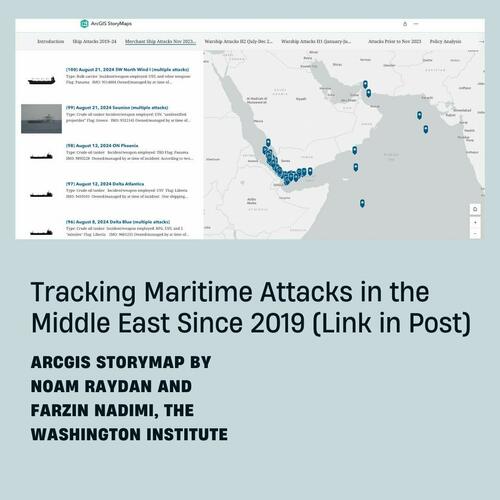
The West faces dire consequences if the Iran-backed Houthi aggression in the southern Red Sea persists. Beyond the intermediate inflation threat caused by shipping disruptions and skyrocketing container rates due to rerouted merchant ships around Africa's Cape of Good Hope, the long-term game is even more troubling: America's "credibility and deterrence" is quickly eroding. This perceived weakness could embolden China to escalate disputes in the South China Sea, sensing a weakening West becoming increasingly entangled in multiple conflicts, including those in Ukraine and the Middle East.
Former Navy Seal and Blackwater founder Erik Prince wrote on X this weekend about the Houthi rebel missile attack on Greek-flagged oil tanker MV Sounion about 77 nautical miles west of the Yemeni port of Hodeidah last week that eventually led to a massive explosion and potential environmental disaster.
"Where is the rightful outrage from environmentalists? Thousands of tons of crude oil will now pour into the Red Sea," Prince wrote on X, adding, "Thousands of tons of crude oil will now pour into the Red Sea."
Where is the rightful outrage from environmentalists? Thousands of tons of crude oil will now pour into the Red Sea.
— ErikDPrince (@realErikDPrince) August 24, 2024
This is a clear sign of the collapse of American credibility and deterrence. Letting the Iranian proxy Houthis shut off a major maritime seaway is an epic fail.… https://t.co/ThmzZ5FAED
To put things in perspective, Sounion is hauling 150,000 tons of crude—a little more than four times the amount spilled by the Exxon Valdez in 1989.
Ten months after Houthi forces in Yemen started disrupting maritime traffic in the Red Sea, global shipping companies have had to reroute merchant ships around the Cape of Good Hope. This has resulted in delays and higher container costs that will only worsen as capacity stretches thin.
Meanwhile, the US and EU have launched numerous military operations committed to ensuring freedom of navigation and maritime security in the highly contested region but have failed repeatedly.
Prince said, "This is a clear sign of the collapse of American credibility and deterrence. Letting the Iranian proxy Houthis shut off a major maritime seaway is an epic fail."
He noted, "America can and must do better! Leadership matters."
3/3 Some keep asking why the Houthis are attacking those commercial vessels. The Yemeni group has an agenda, and they have divided their maritime campaign into five phases so far, and they've been following it. I summarize below the phases based on statements from the group, and… pic.twitter.com/kCBnmHknUN
— Noam Raydan (@NoamRaydan) August 23, 2024
Why is the Biden-Harris administration's failed freedom of navigation military operation in the Red Sea significant?
Because it projects extreme weakness for the world's top superpower, embroiled in conflicts in Eastern Europe, the Middle East, and the Red Sea. This all exposes Biden and other far-left Western leaders who are extraordinarily weak. This perceived vulnerability could now accelerate the possibility of a major US-China confrontation in the South China Sea.
The focus in recent months by military officials and experts on heightening WW3 risks in the South China Sea has been on clashes between Chinese and Filipino ships. We have detailed this extensively:
- US, Allies Condemn China's Actions Against Philippine Vessels In South China Sea
- Watch: Filipino Soldiers Fought Off Axe-Wielding Chinese Coast Guard 'With Bare Hands'
- US, Philippines Working On Intel Sharing Deal Amid Clashes With Chinese Vessels
With the US obligated to defend the Philippines if China attacks the Filipino military, Beijing is observing the West being bogged down in multiple conflicts as a sign of major weakness. As a result, the chances of armed conflict in the South China Sea are rising.
The West faces dire consequences if the Iran-backed Houthi aggression in the southern Red Sea persists. Beyond the intermediate inflation threat caused by shipping disruptions and skyrocketing container rates due to rerouted merchant ships around Africa’s Cape of Good Hope, the long-term game is even more troubling: America’s “credibility and deterrence” is quickly eroding. This perceived weakness could embolden China to escalate disputes in the South China Sea, sensing a weakening West becoming increasingly entangled in multiple conflicts, including those in Ukraine and the Middle East.
Former Navy Seal and Blackwater founder Erik Prince wrote on X this weekend about the Houthi rebel missile attack on Greek-flagged oil tanker MV Sounion about 77 nautical miles west of the Yemeni port of Hodeidah last week that eventually led to a massive explosion and potential environmental disaster.
“Where is the rightful outrage from environmentalists? Thousands of tons of crude oil will now pour into the Red Sea,” Prince wrote on X, adding, “Thousands of tons of crude oil will now pour into the Red Sea.”
Where is the rightful outrage from environmentalists? Thousands of tons of crude oil will now pour into the Red Sea.
This is a clear sign of the collapse of American credibility and deterrence. Letting the Iranian proxy Houthis shut off a major maritime seaway is an epic fail.… https://t.co/ThmzZ5FAED— ErikDPrince (@realErikDPrince) August 24, 2024
To put things in perspective, Sounion is hauling 150,000 tons of crude—a little more than four times the amount spilled by the Exxon Valdez in 1989.
Ten months after Houthi forces in Yemen started disrupting maritime traffic in the Red Sea, global shipping companies have had to reroute merchant ships around the Cape of Good Hope. This has resulted in delays and higher container costs that will only worsen as capacity stretches thin.
Meanwhile, the US and EU have launched numerous military operations committed to ensuring freedom of navigation and maritime security in the highly contested region but have failed repeatedly.
Prince said, “This is a clear sign of the collapse of American credibility and deterrence. Letting the Iranian proxy Houthis shut off a major maritime seaway is an epic fail.”
He noted, “America can and must do better! Leadership matters.”
3/3 Some keep asking why the Houthis are attacking those commercial vessels. The Yemeni group has an agenda, and they have divided their maritime campaign into five phases so far, and they’ve been following it. I summarize below the phases based on statements from the group, and… pic.twitter.com/kCBnmHknUN
— Noam Raydan (@NoamRaydan) August 23, 2024
Why is the Biden-Harris administration’s failed freedom of navigation military operation in the Red Sea significant?
Because it projects extreme weakness for the world’s top superpower, embroiled in conflicts in Eastern Europe, the Middle East, and the Red Sea. This all exposes Biden and other far-left Western leaders who are extraordinarily weak. This perceived vulnerability could now accelerate the possibility of a major US-China confrontation in the South China Sea.
The focus in recent months by military officials and experts on heightening WW3 risks in the South China Sea has been on clashes between Chinese and Filipino ships. We have detailed this extensively:
With the US obligated to defend the Philippines if China attacks the Filipino military, Beijing is observing the West being bogged down in multiple conflicts as a sign of major weakness. As a result, the chances of armed conflict in the South China Sea are rising.
Loading…






